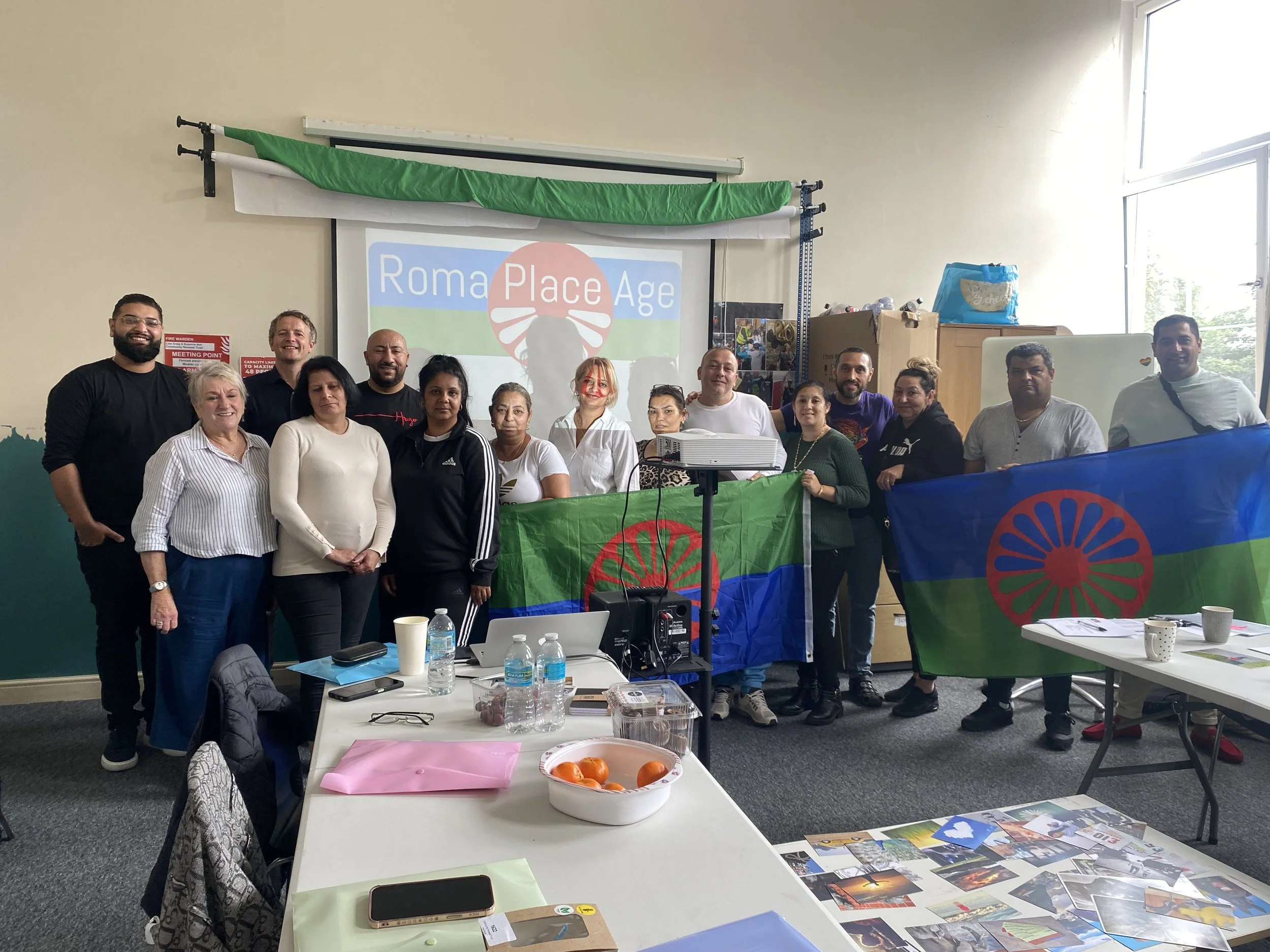Building Bridges Through Research: Community Co-Researcher Training
At RomaPlaceAge, we are on a journey to explore and address the health and wellbeing of Roma communities in the UK in mid to later life (aged 40+). Our project aims to highlight the needs of this often-overlooked group and support them to lead the change by involving members of the Roma community as equal partners in the research process. As part of this process, we have been training Roma community researchers in two locations – Govanhill and Peterborough – with a third training session coming up in Luton later this month.
Training in Govanhill and Peterborough: A Collaborative Effort
On September 17th and 18th, we hosted our first training in Govanhill, Glasgow, in collaboration with our local partner, the Community Renewal Trust Rom Romeha. We were thrilled to train 10 community researchers, supporting them to utilise their knowledge and develop skills to actively engage in the research process.
In Peterborough, hosted by our partners from Compas Charity, the second training session took place on October 7th and 8th. Here, we worked with five dedicated community researchers who brought their energy, questions, and a strong desire to make a difference in their community.
What We Learned Together
These training sessions were not just about sitting in a room and listening – they were about creating a space where everyone felt comfortable to learn, ask questions, and grow as researchers. We covered essential topics such as:
Understanding Research: We dived into the aims of the RomaPlaceAge Project, what is it about, why it focuses on the health and wellbeing of Roma communities aged 40+, and we as a research team to learn about the experiences of our co-researchers. We used interactive postcard exercises to talk about their personal journeys and what was important to the Roma community.
Capturing Roma Stories: We discussed the different methods we were undertaking in the projects, specifically exploring semi-structured interviews as our first stage, understanding the best ways to capture the experiences of the Roma community. We engaged in roleplaying, where members of the Roma community interviewed each other and reflected on the process within the group.
Ethics and Confidentiality: We discussed the importance of ethics in research, informed consent, challenges that may arise during interviews, and how to ensure confidentiality, as well as how we analyse and present our findings. We played out some ethical scenarios and engaged in group discussion on how we would respond to some of the issues that may arise..
Bracketing and Reflexivity: Participants learned about their own positionality as researchers and the role of reflexivity in the research process. We talked about the use of personal diaries which the community researchers will keep to discuss their own position within the research and how this impacts the research process.
The sessions were kept informal, fun, and interactive. Laughter and developing social connections were all part of the learning process. We made every effort to create a comfortable and welcoming environment, as well as plenty of spaces for conversation so issues could be raised.
Language and Cultural Support
To ensure that everyone was on the same page, and all could be well-understood, we provided translations into Slovak/Czech and Romani languages, making sure the training was accessible to all participants. It was crucial to us that the learning experience was inclusive breaking down any language barriers which often act as a barrier to engagement with Roma communities.
Looking Ahead
Next, we will be heading to Luton on October 28th and 29th for our third training session. We are excited to continue building a strong team of Roma community researchers who have such a crucial role in this project not only being actively involved in generating data but also in the other stages of this project, such as analysis of the data, consultations, and distribution of findings relating to the lives of Roma people aged 40+ in the UK.
Beyond that, we will be undertaking further phases of training with the community researchers including for our walking interviews and photo diaries before Christmas. We will also be exploring opportunities to bring our community researchers together across the case study communities so we can share wider experiences.
Why This Matters
RomaPlaceAge is about much more than research – it is about providing the community with a platform to have their voice heard, a group that are often excluded from policy conversations. By training Roma community researchers, we are hoping to provide an opportunity for the research to be rooted in the lived experiences of Roma people.
More broadly, our research approach includes innovative methods like storytelling, exhibitions, arts, and dance to communicate the research findings back to the Romani communities and reach more people but also, crucially, to influence policymakers and service providers to create interventions that address the health and well-being requirements of ageing Roma.
A Collaborative Effort
We could not have done this without the support and enthusiasm of our partners on the research, Community Renewal Trust Rom Romeha and Compas Charity, who made the whole experience run seamlessly. Also, the dedication and expertise of our trainers Professor Ryan Woolrych from Heriot-Watt University and Professor Judith Sixsmith from Dundee University, along with Research Associate Sasho Marinov from Heriot-Watt University who were there to provide support and complement the training.
Stay Tuned!
We are just getting started, and there is so much more to come. We are looking forward to finding out what our Roma community researchers will discover and how they will help shape the future of ageing for Roma communities in the UK. Keep following us on www.romaplaceage.com for more updates, stories, photos and insights into this exciting journey!



